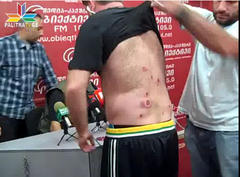Led by the opposition parties, the demonstration went on for several days in front of the parliament. Demonstrators were demanding the resignation of the President of Georgia, Mikheil Saakashvili. The demonstrators’ permission lasted until 26 May.
At midnight on 25 May, when the time of the legally held demonstration expired, the police began raiding. According to the data given by the Ministry of Interior – more than 100 people were detained, 2 were killed. According to the NGOs, around 50 persons are still missing. As for the injured, various sources differ both in facts and figures, but approximately 70 people had to be taken to hospital. Two more corpses of people who participated in the demonstration have been detected, but the police claims that these were victims of an electric power accident.
During the crackdown on protesters, journalists were beaten as well. Witnesses say that the police targeted the journalists and deliberately beat them.
Reporters Without Borders is alarmed by the violence used by the Georgian security forces in the early hours of 26 May against journalists covering the anti-government demonstration in Tbilisi. "This use of force against reporters who were just covering events is intolerable. We urge both the authorities and the opposition to respect journalists, who must not be the collateral victims of the current political tension," says Reporters Without Borders.
According to the Media Advocacy Coalition, the following facts were observed on the violence against journalists on 26 May:
Malkhaz Chkadua, correspondent of the Interpressnews news agency, was detained and taken to Digomi District Police Station. He was released some time later. As Chkadua states, he and other journalists were verbally abused for up to 90 minutes. Chkadua saw many other detainees in the police station at the time he was there himself.
Darejan Paatashvili, also a journalist for Interpressnews, was physically abused by policemen. They confiscated the video camera she was using and her cameraman’s video camera.
Media.ge witnessed how policemen physically abused Nato Gogelia and took away the camera from the Guria News journalist. An armed police officer physically abused David Mchedlidze, editor of Media.Ge. Mchedlidze was not allowed to use a camera.
Diana Khoperia, an independent journalist, suffered serious head injuries, as a result of police violence. Zaira Miqatadze, journalist for the “Rezonansi” newspaper, was also physically abused. Tamaz Kupreishvili was also beaten by the police. Her camera was confiscated. Nino Kakhniashvili, a journalist for Netgazeti, was poisoned with tear gas. She was taken to hospital, where she received first aid before she was checked out again.
Correspondents of “Asaval–Dasavali” were also injured: Beka Sivsivadze was shot with rubber bullets in the back. Mamatsashvili George was beaten with clubs. Several days later, he can still hardly move. A Media.ge correspondent was also beaten with rubber clubs. After the journalist displayed his Press ID, a policeman hit him with a rubber club on the head and in the back several times. “We told them we’re journalists, but even so, they opened fire directly at us,” said Sivsivadze, and added that they were arrested and put into so-called yellow buses.
Dato Mchedlidze (the editor of www.media.ge) commented: “When the raid started, the journalists were standing at Rustaveli Theatre. Some policemen came towards us. We told them that we’re from the media. They made a corridor and let us go. On the other side of the street another group met us, and we told them the same, but they began to take away our cameras, cassettes, memory cards. I saw journalist Nato Gogelia being deprived of her camera. After that, we moved to another street. Law-enforcers were beating people and forcing them to move from one yard to another. When the journalist tried to take photos or to film, they came and took the equipment away.”
“Human Rights Watch” said that beating the demonstrators, who did nothing improper, was not right of the government. The organization has called on the government to immediately start investigating the facts. Dunja Miatovich, OSCE’s Representative on Freedom of the Media, has also reacted negatively to the Georgian police’s excessive use of force, including assaults on and detention of journalists. She described the facts as ‘alarming’.
“Despite the fact, that the representatives of the press had press identification cards, at least ten of Georgian and foreign journalists were verbally and physically assaulted by the police”- reads OSCE press –release. Miatovich called on Grigol Vashadze, Minister of Foreign Affairs, to ensure the security of journalists while performing their professional duties.
Shota Utiashvili, Head of the analytical department of the Ministry of Internal Affairs, said that the police was forced to use force against the demonstrators. While apologizing to one of the injured journalists, none of all the others injured were even mentioned.
Tea Topuria





